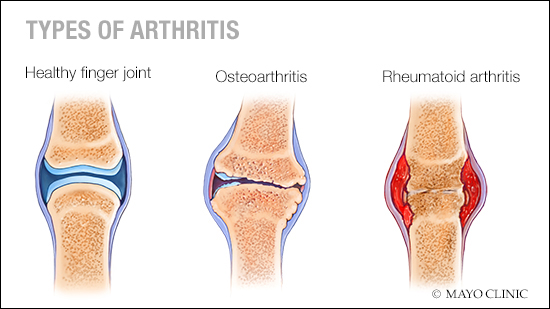-
Featured News
Mayo Clinic Q and A: Understanding osteoarthritis and rheumatoid arthritis
 DEAR MAYO CLINIC: For the past few months, I’ve had a lot of stiffness in a few of my fingers, especially toward the end of the day. I’m 47. Could this be the beginning of arthritis? If so, at what point should I see a doctor? Can arthritis be treated in the beginning stages?
DEAR MAYO CLINIC: For the past few months, I’ve had a lot of stiffness in a few of my fingers, especially toward the end of the day. I’m 47. Could this be the beginning of arthritis? If so, at what point should I see a doctor? Can arthritis be treated in the beginning stages?
ANSWER: It’s possible that the stiffness in your fingers could be related to arthritis. If the discomfort is disrupting your daily routines — or if the symptoms get worse or you notice new ones — it would be a good idea to see your primary care physician for an evaluation. Treatment for arthritis is available, although specific treatment options depend on the diagnosis.
There are two basic types of arthritis: osteoarthritis and rheumatoid arthritis. Osteoarthritis is, by far, the most common. It often develops as people age, when the protective cartilage on the ends of the bones wears down over time. Osteoarthritis leads to joint pain, tenderness, stiffness and loss of flexibility.
Rheumatoid arthritis is an autoimmune disease in which the body’s immune system attacks the synovium, the lining of the membranes that surround the joints. It causes chronic inflammation, along with joint pain, swelling and stiffness. In some people, rheumatoid arthritis eventually can lead to joint damage and disability.
Despite the fact that their symptoms may be similar, the two forms of arthritis differ significantly from one another and require different forms of treatment. Seeing a health care professional early is a good idea, as some of the treatments can affect the natural progression of the condition.
Rheumatoid arthritis typically affects the small joints first, particularly those that connect the fingers to the hands and the toes to the feet. Early-warning signs of rheumatoid arthritis include joint swelling, especially in the knuckles at the base of the fingers, or in the wrists or feet; stiffness of the hands, wrists or feet that occurs in the early morning and improves after activity; and unexplained fatigue, fever or weight loss.
Even if your symptoms don’t match any of those on that list, it still is reasonable to consult with your health care provider if the stiffness in your fingers is bothersome to you or if it’s making it hard for you to do your daily activities. Let your health care provider know if you have a parent, sibling or child with rheumatoid arthritis, which means you may have an increased risk of the disease.
Your health care provider can assess your situation and, if necessary, recommend a treatment plan based on your circumstances. Neither form of arthritis can be cured, but treatment often can help control symptoms.
Treatment for osteoarthritis generally includes pain medication, physical therapy and, in some cases, corticosteroid injections. Modifying activities to reduce stress on the joints often is necessary, as well.
For rheumatoid arthritis, treatment involves medication to reduce inflammation, as well as drugs to slow the progression of the disease and reduce joint damage. Medication that targets the immune system also may ease inflammation, and lower the risk of joint and tissue damage. Physical and occupational therapy can be useful for people who have rheumatoid arthritis.
At this point, though, the first step is to assess your symptoms and decide if you want to get an evaluation. If so, your health care provider can perform a physical exam, review your medical history and, if necessary, recommend testing to investigate the underlying cause of your joint stiffness. If a medical condition is found, treatment can be customized to fit your individual needs. — Dr. John Davis III, Rheumatology, Mayo Clinic, Rochester, Minnesota
****************************
Related Articles
- Mayo Clinic Q and A: Treating thumb arthritis published 9/4/18
- Mayo Clinic Q and A: Stem cell therapy for arthritis published 5/22/18
- Mayo Clinic Minute: What is rheumatoid arthritis? published 3/20/18
- Mayo Clinic Minute: Finding relief for osteoarthritis pain published 3/19/18
- Mayo Clinic Q and A: Managing arthritis pain published 3/2/18
- Science Saturday: Genetic testing for earlier diagnosis and treatment of rheumatoid arthritis published 2/3/18







